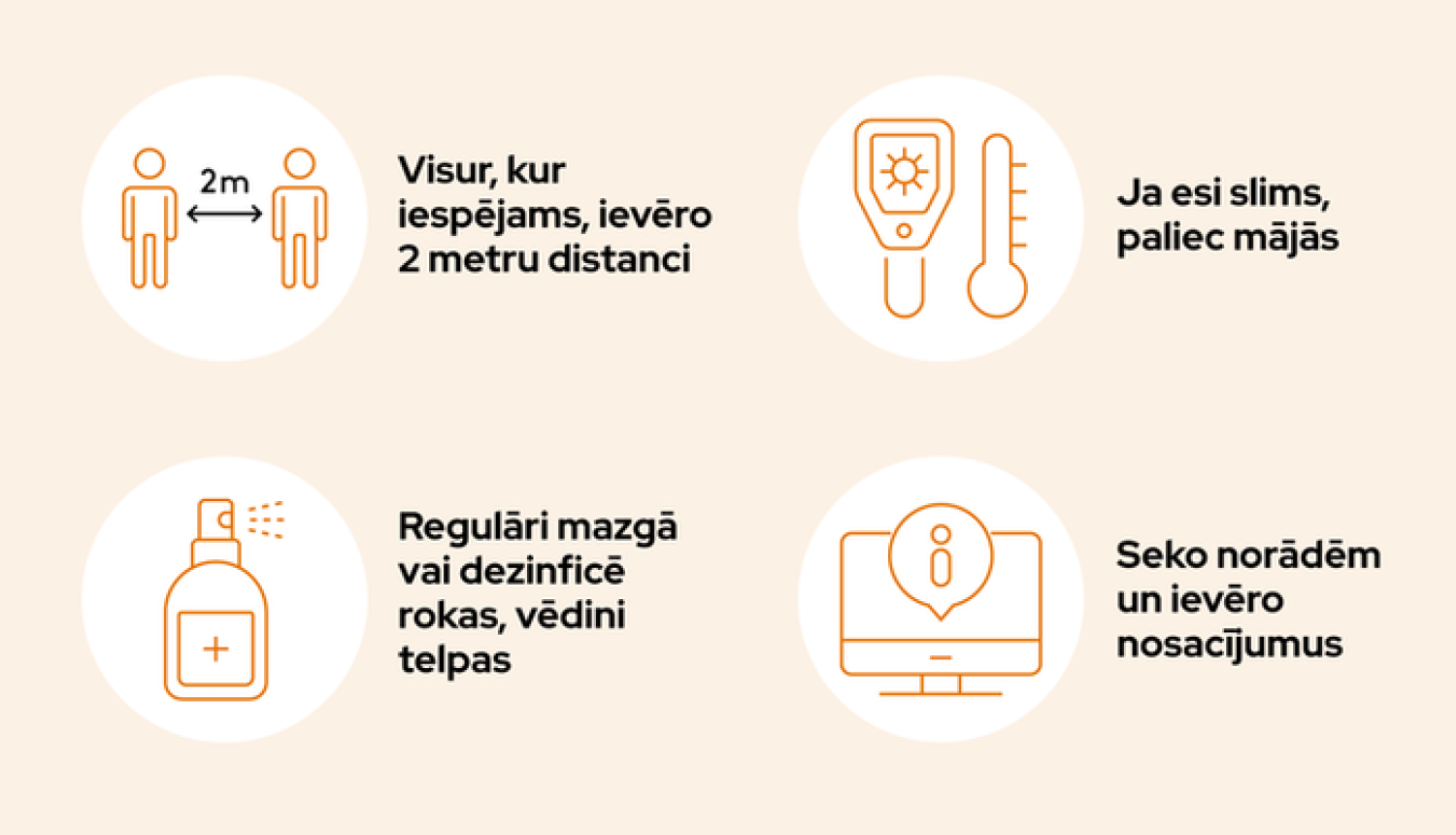Although the situation regarding the spread of the virus in Latvia is stable and some of the precautionary measures have been eased with the lifting of the state of emergency, a number of restrictions must still be observed. This is important for keeping the morbidity rate of Covid-19 low and to be able to further ease the restrictions in the coming months. It is also very important for everyone to assess the risks themselves and to take responsibility for their own health and the health of the people around them.
The basic principles stay the same: wherever possible, keeping a 2 metre distance from others; washing your hands; staying home if you are ill; following the informative signs, for example, in public places; and complying with the instructions provided by specific service providers or event organisers.
Social distancing, especially between strangers, remains crucial to limiting the spread of the virus, while there are a number of situations where it can be followed more loosely: for example, when performing work duties in nurseries or camps, as well as when participating in sports, dancing, or performing arts classes. In these situations, people know each other, meaning that epidemiologists will be able to identify contact persons in case someone falls ill. On the other hand, on public transport, where it is often not possible to keep the 2 metre distance between people, it is still necessary to use a mouth and nose covering.
As of 10 June, the number of persons allowed to gather in one place has been increased to up to 100 persons indoors and 300 persons outdoors, subject to observing a 2 metre distance between persons. These conditions apply to venues in the provision of services and public events. This means that these conditions do not apply to a private event in a private area, such as your own home or garden. However, it is up to the people themselves to take responsibility for private events and to respect the precautionary measures.
The restrictions on the number of people do not apply to places where there is an active flow of people: for example, trading and public catering places, museums, exhibitions, and nature trails, if no event is held in these places. In these places, people do not stay in one spot for a long time, making it impossible to determine the number of people in them; however, these places have other specific conditions - for example, the obligation to ensure an area of 4 m2 per person.
If the epidemiological situation will allow, from 1 July it is planned to allow gatherings of up to 500 persons indoors where the total area is larger than 1000 m2, assuming it can be ensured that the event does not occupy more than 50% of the capacity of the room and that each attendee has an area of 4 m2 to him/herself. This means that the owners will have to calculate the number of people that may be present on their premises simultaneously. At outdoor events, up to 1000 persons could be allowed to gather. Moreover, from 1 August, up to 250 people could gather indoors where the total area doesn’t exceed 1000 m2.
There are additional conditions for public catering places: a distance of 2 metres must be ensured between the tables. Until 1 July, no more than 4 persons can sit at one table indoors and no more than 8 people at one table outdoors (for example, on terraces).
As before, cultural, sports, entertainment, and religious places may start working no earlier than 6.30 and close no later than 24.00. Open-air cinemas and public catering places are an exception, as they must close no later than 2.00 a.m.
The government has also decided that children's camps may have up to 30 participants, while adult non-formal education activities can take place in groups of up to 50 persons. There are also special conditions regarding sports trainings: one training group must have no more than 30 people, including coaches. Indoor sports events taking place until 31 July in premises with a total area smaller than 1000 m2 must take place without spectators.
With regard to travel, the Ministry of Health calls for a careful assessment of the necessity. It must be taken into account that when abroad there is not only a higher risk of becoming infected with Covid-19, but also the risk of being quarantined and having to observe that quarantine in the specific country. At the same time, it must be borne in mind that the external border of the EU is not currently open for travel, meaning that travel to third countries is not possible. Travel is also not possible to those EU and EEA countries which are published on the SPKC website as countries with a high risk to public health (a 14-day cumulative number of Covid-19 cases that exceeds 25 per 100,000 inhabitants) and, upon entering Latvia from a country where the 14-day cumulative number of Covid-19 cases per 100,000 inhabitants exceeds 15, 14-day self-isolation will have to be observed from the day of leaving that country.
All the conditions that must be observed from now on by both entrepreneurs and every inhabitant of Latvia can be found in the regulations of the Cabinet of Ministers on “Epidemiological Security Measures for Limiting the Spread of the Covid-19 Virus” that were approved today, 9 June.
Anna Strapcāne
Communication Specialist of the Ministry of Health
Telephone: +371 67876106; +371 20388356
e-mail: anna.strapcane@vm.gov.lv



